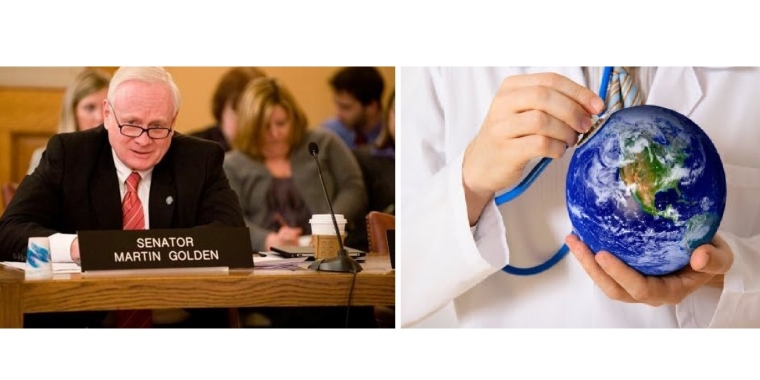
Killer Germ In New York Hospitals Targeted
Betsy McCaughey, Ph.D., Chairman of the Committee to Reduce Infection Deaths (RID) and State Senator Martin J. Golden (R-C. Brooklyn) joined with families affected by hospital infection deaths to announce a bill to require hospitals in New York State to screen patients coming into hospitals for the bacterium MRSA (methicillin-resistant Staphylococcus aureus) “I commend Dr. Betsy McCaughey and her efforts with the Committee to Reduce Infection Deaths. Working together, here in New York City, where the best healthcare and hospitals are available,” says Senator Golden, “we will implement a necessary precaution, the MRSA test, and all New Yorkers will be better for it.”
“New Jersey, as well as Pennsylvania and Illinois, have passed laws to protect their residents from hospital MRSA infections. New Yorkers shouldn’t have to cross the Hudson River to get safe care,” says McCaughey.
SIZE OF THE PROBLEM: Over 94,000 people in the U.S. contract MRSA infections each year, and an estimated 18,000 die from them. About 85% of these infections are caused by a germ picked up in a hospital or other healthcare facility, according to new data in the October 17th, 2007 issue of the Journal of the American Medical Association.
SCREENING ESSENTIAL: Some fifty studies show that it is not possible to prevent MRSA hospital infections without screening. You cannot stop this MRSA germ from racing through hospitals if you don’t know which patients are coming into the hospital with it. Screening is essential.
People who unknowingly carry MRSA shed it in tiny particles on wheelchairs, bedrails, blood pressure cuffs, and all other surfaces. MRSA can live for up to 90 days on surfaces and fabrics. The germ only makes you sick when it gets inside your body through a catheter, surgical incision or other open wound, or a ventilator.
THE SCREENING TEST: The test is noninvasive, a simple nasal or skin swab. Patients who test positive can usually easily remove the bacteria in a few days by bathing with chlorhexidine soap.
ARE MRSA INFECTIONS PREVENTABLE? Yes, at least 90% preventable. Denmark, Holland and Finland nearly eradicated these infections through screening incoming patients and taking precautions to prevent the germs from spreading to other patients on hands, gloves, lab coats, blood pressure cuffs, wheel chairs and other surfaces. Numerous hospitals in the U.S. are proving these precautions work here too. From 2000 to 2003, the University of Pittsburgh-Presbyterian reduced MRSA infections 90% in an intensive care unit, and is now replicating the method throughout the UPMC system.
ARE MANY HOSPITALS IN THE U.S. SCREENING? Yes, these include the entire Veterans’ Administration, Evanston-Northwestern in Illinois, Johns Hopkins in Baltimore, Brigham and Women’s Hospital in Boston, New England Baptist in Boston, and North Shore-Long Island Jewish in New York. Soon, hospitals in New Jersey, Pennsylvania and Illinois will have to screen in compliance with new state laws.
CAN HOSPITALS AFFORD TO SCREEN? They can’t afford not to. When a patient develops an MRSA infection and has to spend many weeks hospitalized, the hospital is not paid for most of that additional care. “Virtually all published analyses” show that screening and follow-up precautions cost far less than treating hospital infections,” (Lancet, September, 2006)
“Too many people are dying annually here in New York and throughout the U.S., dying from something that can be prevented,” Golden says. “We must question why this is happening, and why we are not taking action to reverse this trend and reduce the numbers of unnecessary deaths. We must act now to pass this critical legislation – the lives of many New Yorkers are depending on it.”
“New York lawmakers should enact this screening law,” says McCaughey. “They should also insist on clean hospitals. Restaurants are inspected yearly for cleanliness. But not hospitals. Not even operating rooms. That’s absurd. MRSA spreads from patient to patient on unclean hands, and inadequately cleaned equipment.”



